| Srl | Item |
| 1 |
ID:
096703
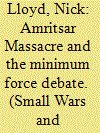

|
|
|
|
|
| Publication |
2010.
|
| Summary/Abstract |
This article re-examines one of the most infamous incidents in British imperial history: the Amritsar Massacre of 1919, and analyses it within the context of the British Army's minimum force philosophy. The massacre has long been regarded as the most catastrophic failure of minimum force in the history of the British Army. This article reconsiders the arguments over the shooting at Amritsar and the role of Brigadier-General Reginald Dyer, and questions the accepted view that the massacre was such a failure of minimum force. It argues that the circumstances surrounding the massacre must be understood before judging the incident and given these factors it is possible to see it within a minimum force framework.
|
|
|
|
|
|
|
|
|
|
|
|
|
|
|
|
| 2 |
ID:
096704
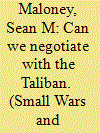

|
|
|
|
|
| Publication |
2010.
|
| Summary/Abstract |
The belief that the insurgency in southern Afghanistan is a singular entity and the assumption that negotiations with that entity can bring an end to the conflict are simplistic and do not take into account the other insurgent partners, nor the role of local power brokers. Care must be taken when providing advice in the public domain on how to end or limit conflict in Afghanistan.
|
|
|
|
|
|
|
|
|
|
|
|
|
|
|
|
| 3 |
ID:
096706
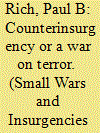

|
|
|
| 4 |
ID:
096705
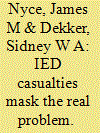

|
|
|
|
|
| Publication |
2010.
|
| Summary/Abstract |
Casualty figures suggest that the US/Allied Counter Improvised Explosive Device (C-IED) policy and the present allocation of national assets, resources, and intellectual capital have not been very successful. A number of explanations for why this has been the case are discussed and critiqued here.
|
|
|
|
|
|
|
|
|
|
|
|
|
|
|
|
| 5 |
ID:
096697


|
|
|
|
|
| Publication |
2010.
|
| Summary/Abstract |
Since 9/11, counterinsurgency is back in fashion; the 'war on terror' has even been branded a 'global counterinsurgency'. However the context within which counterinsurgency originally arose is critical to understanding the prospects for its present success; the radically changed environment in which it is currently being conducted casts into considerable doubt the validity of the doctrine's application by many national militaries currently 'rediscovering' this school of military thought today. Above all, classical counterinsurgency was a profoundly imperial, state-centric phenomenon; consequently it only rarely faced the thorny issue of sovereignty and legitimacy which bedevils and may doom these same efforts today.
|
|
|
|
|
|
|
|
|
|
|
|
|
|
|
|
| 6 |
ID:
096701
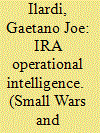

|
|
|
|
|
| Publication |
2010.
|
| Summary/Abstract |
This article will seek to provide a detailed examination of the IRA's operational intelligence methodologies. Providing not only a lengthy discussion on the organization's intelligence collection protocols, it will also examine the interplay between intelligence and IRA decision-making. It will be contended that intelligence's influence resided in its ability to introduce a strong element of predictability into the IRA's decision-making process. This depended on an ability to construct a detailed intelligence picture of the target and its geographical milieu so as to minimize the likelihood of volunteers encountering unforeseen circumstances that could adversely affect planned or anticipated outcomes.
|
|
|
|
|
|
|
|
|
|
|
|
|
|
|
|
| 7 |
ID:
096699
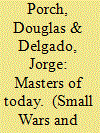

|
|
|
|
|
| Publication |
2010.
|
| Summary/Abstract |
Military intelligence forms a vital element of counter-insurgency operations. When the Colombian military suffered setbacks at the hands of the FARC in the 1990s, military intelligence received much of the blame. It was also accused of human rights violations. With the help of US. financed Plan Colombia, military intelligence has been reorganized, expanded, strengthened with upgraded technical capabilities, constrained to operate within defined legal boundaries, and refocused to match the government's strategic priorities. Human intelligence has laid the groundwork for impressive tactical and operational results since 2006. Nevertheless, like all intelligence services, that of the Colombian military continues to experience problems of structure and political outlook.
|
|
|
|
|
|
|
|
|
|
|
|
|
|
|
|
| 8 |
ID:
096700


|
|
|
|
|
| Publication |
2010.
|
| Summary/Abstract |
This article examines the British Army's deployment in support of the civil power in Northern Ireland. It argues that the core guiding principles of the British approach to counterinsurgency (COIN) - employing the minimum use of force, firm and timely action, and unity of control in civil-military relations - were misapplied by the Army in its haste to combat Irish Republican Army (IRA) terrorism between 1971 and 1976. Moreover, it suggests that the Army's COIN strategy was unsuccessful in the 1970s because commanders adhered too closely to the customs, doctrine, and drill applied under very different circumstances in Aden between 1963 and 1967, generally regarded as a failure in Britain's post-war internal security operations. The article concludes with a discussion of the British government's decision to scale back the Army's role in favour of giving the Royal Ulster Constabulary primacy in counter-terrorist operations, a decision which led ultimately to success in combating IRA violence.
|
|
|
|
|
|
|
|
|
|
|
|
|
|
|
|
| 9 |
ID:
096698
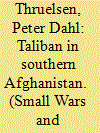

|
|
|
|
|
| Publication |
2010.
|
| Summary/Abstract |
This article gives an in-depth description and analysis of the Taliban insurgency in southern Afghanistan in 2008. It describes the local dynamics of the insurgency and argues that the Taliban should not be seen as a unified hierarchical actor that can be dealt with as part of a generic approach covering the whole of Afghanistan. The article will show that the insurgency in southern Afghanistan is highly localised in nature, being to a large extent driven by local commanders and local area networks often centred on individual commanders themselves. It will also show that the driver or cause behind the insurgency differ for the local Afghan Taliban and the foreign Pakistani Taliban respectively. The nature of the southern insurgency, with the local Taliban commanders working through local knowledge networks with a locally determined cause, implies that a strategic-level 'peace deal' with Tier I of the strategic Taliban leadership will not create the desired effect of ending the insurgency - there will not be an overall domino effect in these parts of the country.
|
|
|
|
|
|
|
|
|
|
|
|
|
|
|
|
| 10 |
ID:
096702


|
|
|
|
|
| Publication |
2010.
|
| Summary/Abstract |
This paper systematically analyzes the causes of the escalation of violence during the initial stages of the Jeju Island Rebellion and the failure of South Korean counterinsurgency operations. It is argued that four interrelated factors provided the conditions for armed insurgency in the small island of Jeju: inter-agency tension between the Korean National Police (KNP) and the Korean Constabulary; the mainlanders' misinterpretation of the insurgency; the effect of systematic police brutality; and the role of youth groups. Consequently, two counterinsurgency lessons will be drawn from this study: that inter-agency cooperation and coordination at the tactical level between security branches and the incorporation of local population at the micro-level is essential in conducting efficient and effective counterinsurgency operations.
|
|
|
|
|
|
|
|
|
|
|
|
|
|
|
|